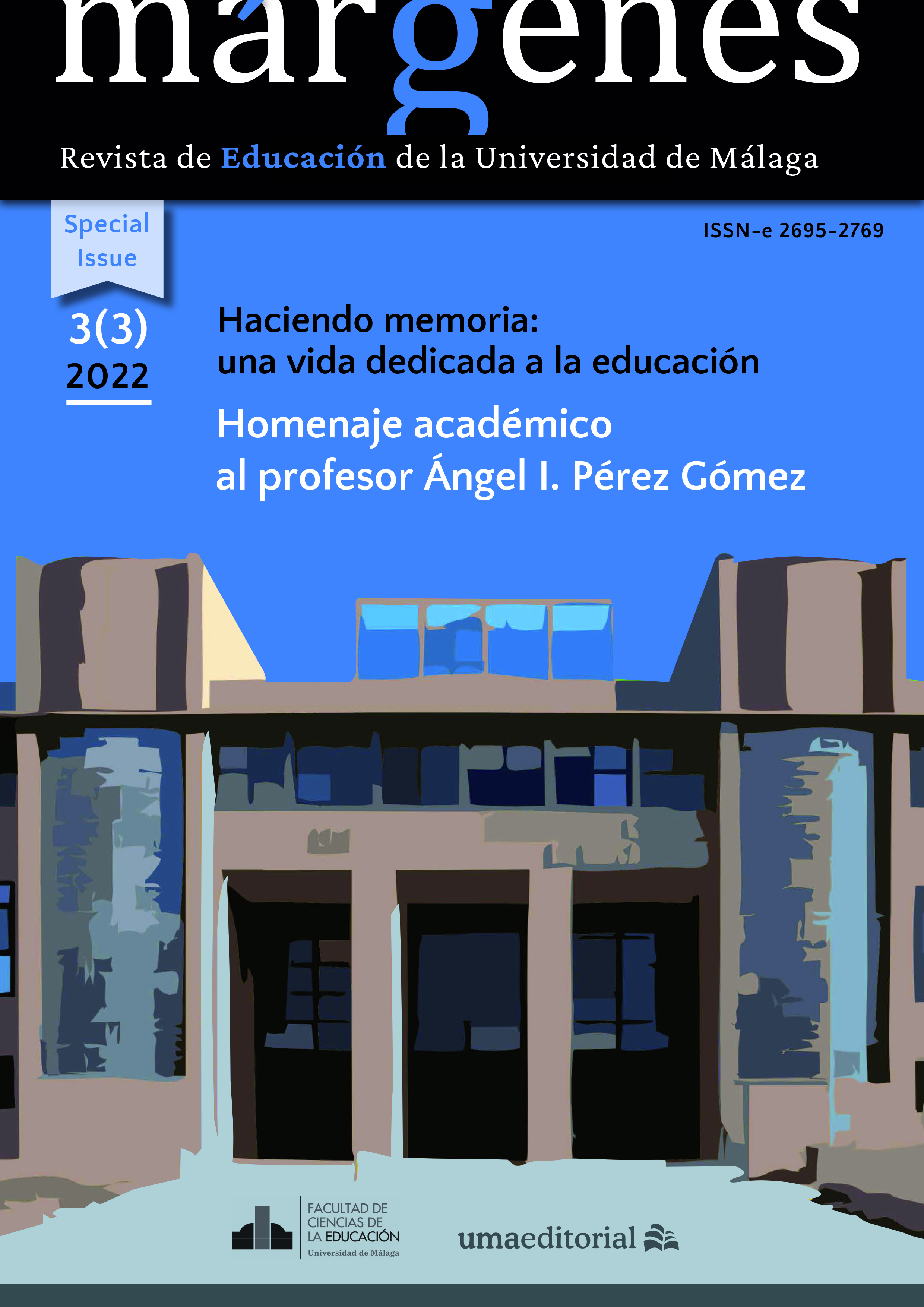Automatism and Consciousness: keys for teacher training at the university
DOI:
https://doi.org/10.24310/mgnmar.v3i3.15118Keywords:
teacher training, university teacher, practical knowledge, practical thinkingAbstract
This work is a tribute to my esteemed colleague Ángel Pérez Gómez, because in it I make a reflection on the teacher training of university professors impregnated with some of his ideas and contributions. The central idea that I suppose shared is that university teachers, who have not had initial teacher training, act in their classes with implicit practical knowledge, loaded with automated routines in accordance with the context of conventional normality that characterizes the university teaching culture. The proposal that is presented consists of promoting practical thinking in teachers, through awareness of the aforementioned automatisms and their critical analysis, generating new conscious meanings, more grounded and rigorous, about teaching and learning. (theorize practice). This process is completed with a return to action, designing, experimenting and evaluating new, more conscious and complex patterns of action, gradually replacing the aforementioned automatisms (experimenting the theory). Collaborative action research, Lesson Study and Classroom Improvement Cycles are good examples of these cyclical and progressive teaching improvement strategies. The paper also presents examples that illustrate these cycles, obtained from the Teacher Training and Innovation Program of the University of Seville. In short, the work shows that the key to teacher training is to slowly work on the interaction between automatism in the classroom and the development of conscious thought.
Downloads
Metrics
Publication Facts
Reviewer profiles N/A
Author statements
Indexed in
-
—
- Academic society
- N/A
- Publisher
- Universidad de Málaga
References
De-Alba-Fernández, N. y Porlán, R. (Coords.) (2020). Docentes universitarios. Una formación centrada en la práctica. Morata.
Delord, G., Hamed, S., Porlán, R. y De-Alba-Fernández, N. (2020). “Los Ciclos de Mejora en el Aula”. En N. De-Alba-Fernández y R. Porlán (Coords.), Docentes universitarios. Una formación centrada en la práctica, (pp. 127-162). Morata.
Elliot, J. (2022). “Lesson Study: formando en el contexto de la globalización”. En A. I. Pérez-Gómez y E. Soto (Coords.), Lesson Study. Aprender a enseñar para enseñar a aprender, (pp. 25-46). Morata.
Pérez-Gómez, A. I. (2022a). “Otra pedagogía para otra normalidad”. En A. I. Pérez-Gómez y E. Soto (Coords.), Lesson Study. Aprender a enseñar para enseñar a aprender, (pp. 49-66). Morata.
Pérez-Gómez, A. I. (2022b). “Del conocimiento al pensamiento práctico. La compleja construcción de la subjetividad profesional del profesorado”. En A. I. Pérez-Gómez y E. Soto (Coords.), Lesson Study. Aprender a enseñar para enseñar a aprender, (pp. 67-88). Morata.
Porlán, R. (Coord.) (2017). La enseñanza universitaria. Cómo mejorarla. Morata.
Porlán, R., Delord, G., Hamed, S y Rivero, A. (2020). El cambio de las concepciones y emociones sobre la enseñanza a través de ciclos de mejora en el aula: un estudio con profe-sores universitarios de ciencias. Formación universitaria, 13(4), 183-200. http://dx.doi.org/10.4067/S0718-50062020000400183
Porlán, R. y Villarejo-Ramos, A. F. (Coords.) (2022). Aprendizaje universitario. Resultados de investigaciones para mejorarlo. Morata.
Rivero, A., Hamed, S., Delord, G. y Porlán, R. (2020). Las concepciones de docentes universitarios de ciencias sobre los contenidos. Enseñanza de las ciencias, 38(3), 15-35. https://doi.org/10.5565/rev/ensciencias.2845
Schön, D. (1989). El profesional reflexivo. Cómo piensan los profesores cuando actúan. Paidós.
Soto, E. (2022). “Lesson Study: teorizar la práctica y experi-mentar la teoría”. En A. I. Pérez-Gómez y E. Soto (Coords.), Lesson Study. Aprender a enseñar para enseñar a aprender, (pp. 113-138). Morata.
Vygotsky, L. S. (2009). El desarrollo de los procesos psicoló-gicos superiores. Crítica.
Downloads
Published
How to Cite
Issue
Section
License
The editorial team of Márgenes supports an open Access policy of scientific knowledge. apostamos claramente por una política de acceso abierto del conocimiento científico (see Berlin Declaration).
Authors with work published in this journal accept the following conditions:
- This journal provides immediate free access to its content under the principle of making research freely available to the public. All contents published in Márgenes are subject to the Creative Commons Reconocimiento-SinObraDerivada 4.0 Internacional
It is the responsibility of the authors to obtain the necessary permissions of the images that are subject to copyright.
Authors whose contributions are accepted for publication in this journal will retain the non-exclusive right to use their contributions for academic, research and educational purposes, including self-archiving or deposit in open-access repositories of any kind.
The electronic edition of this magazine is edited by the Editorial of the University of Malaga (UmaEditorial), being necessary to cite the origin in any partial or total reproduction.
- Authors can enter into other additional independent contractual agreements for the non-exclusive distribution of the version of the article published in this journal (e.g. including it in an institutional repository or publishing it in a book) on the condition that they clearly indicate that the work was originally published in this journal.
- Authors are allowed and recommended to publish their work on the Internet (for example on institutional and personal websites), before and after the publication, as this could lead to constructive exchanges and a more extensive and quick circulation of published works (see The Effect of Open Access).















